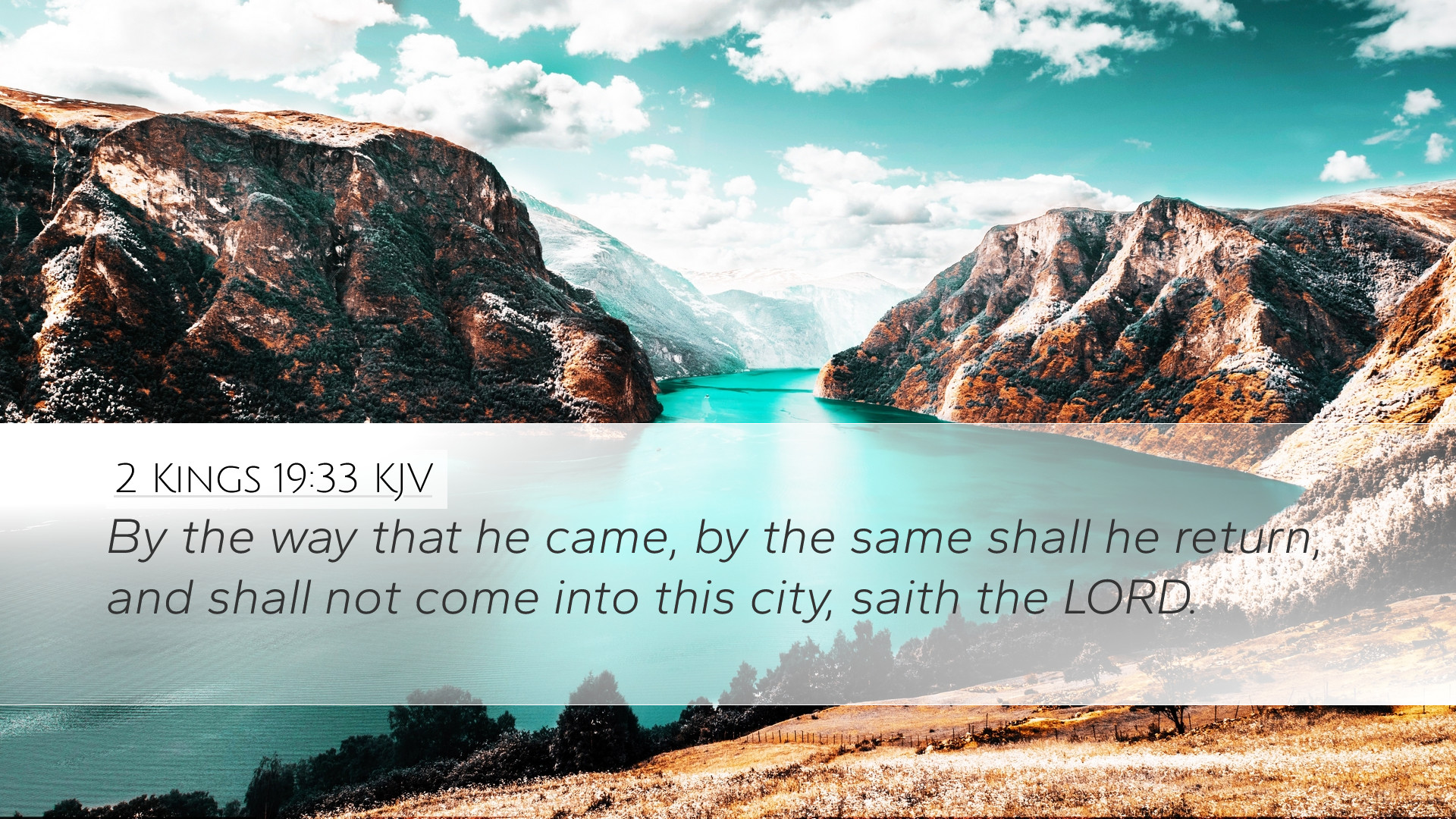2 Kings 19:33 states: "By the way that he came, by the same shall he return, and shall not come into this city, saith the LORD." This verse is part of a critical moment in Israel's history during the reign of King Hezekiah, where the threat posed by King Sennacherib of Assyria looms large. The commentary on this verse draws upon significant insights into God’s promise of protection, historical context, and theological implications.
Contextual Overview
The context of 2 Kings 19 is pivotal to understanding the significance of this verse. King Hezekiah of Judah is confronted by the mighty Assyrian army led by King Sennacherib, who has already conquered many nations and threatens to do the same to Judah. This moment reflects a theological confrontation between the God of Israel and the so-called power of the Assyrian empire.
Historical records confirm the Assyrian campaigns during this period, providing a backdrop to the events chronicled in 2 Kings. Sennacherib’s threats against Jerusalem and his audacious declarations of triumph over the God of Israel prompt a divine response that emphasizes God's sovereignty and protective power.
Theological Implications
Many public domain commentators emphasize the theological richness of this verse which exemplifies God's fidelity to His promises. Matthew Henry notes that God firmly reassures Hezekiah that Sennacherib, in his arrogance, will not enter the city. The phrase "by the same shall he return" indicates God’s sovereign control over every situation, suggesting that although Sennacherib believes he is in command, it is God who ultimately directs the outcome.
Albert Barnes comments on God's message as a proclamation of both judgment against the Assyrians and comfort for His people. He underscores that not only does this verse emphasize the physical security of Jerusalem, but it also serves to reassure the people of Judah of God's presence and his active involvement in their affairs. His intervention is a clear reminder that even in the face of insurmountable odds, faith in God yields divine deliverance.
Adam Clarke further explicates this assurance by highlighting the significance of the means by which Sennacherib will be thwarted – it is not by the might of Israel's army, but by the divine decree of the Lord. This reinforces the notion that victory arises from reliance upon God rather than military strength or alliances with men.
Historical Reflection
Historically, the fate of Jerusalem unfolded as promised. After Hezekiah's earnest prayer and God's declaration through the prophet Isaiah, the Assyrian army was decimated, significantly altering the course of Israel's history. 2 Kings 19:35 speaks of an angel of the Lord striking down 185,000 Assyrian soldiers in a single night, thereby cementing God’s power over human empires.
The overwhelming rescue of Jerusalem serves as an enduring reminder of God's might and faithfulness which should inspire confidence in believers throughout history, particularly when faced with trials that seem beyond their control.
Spiritual Application
There are numerous spiritual applications gleaned from this verse that remain pertinent today:
- God's Sovereignty: The assurance that God is in control, even when circumstances appear dire, should embolden believers in faith. Believers are encouraged to recognize that no power can thwart divine purpose.
- The Power of Prayer: In the narrative leading to this verse, Hezekiah's prayer is pivotal. This highlights the ongoing importance of prayer in the believer’s life, emphasizing that they must bring their fears and concerns to God.
- Divine Protection: Understanding and trusting in God's protection can provide unparalleled peace. The promise to Hezekiah exemplifies how God watches over His people, offering comfort in any tumultuous time.
- Confidence in Adversity: Just as Hezekiah faced an overwhelming enemy, believers are often confronted with daunting challenges. This verse invites them to respond with faith and dependence upon God's ability to deliver.
Conclusion
In summary, 2 Kings 19:33 is not simply a historical recounting but a profound declaration of God's sovereignty and His covenant faithfulness. The insights from commentators such as Henry, Barnes, and Clarke collectively underline the assurance that, in the face of external threats and challenges, the commitment of God to protect His people remains steadfast. This verse, contextualized within the broader narrative of Judah's history, serves as a timeless reminder of God's providential care and the power of faith.
For pastors, students, theologians, and scholars, engaging with this verse and its commentary can deepen their understanding of both the Old Testament and the nature of God's promises, equipping them to face the trials of life with a faith anchored in divine assurance.


